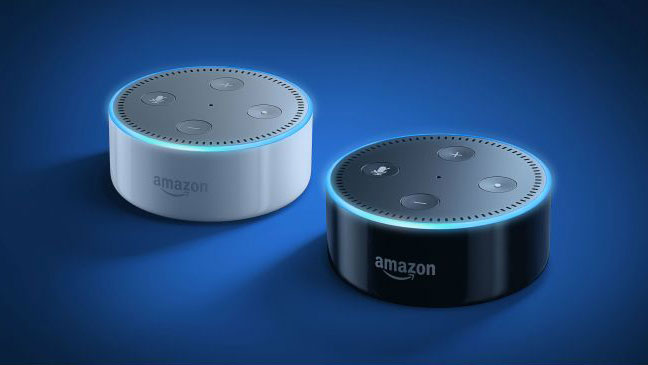NHS partners with Amazon to offer health advice via Alexa
Aim is to ease pressure on the NHS, but is it really such a good idea?

Sign up to Creative Bloq's daily newsletter, which brings you the latest news and inspiration from the worlds of art, design and technology.
You are now subscribed
Your newsletter sign-up was successful
Want to add more newsletters?

Five times a week
CreativeBloq
Sign up to Creative Bloq's daily newsletter, which brings you the latest news and inspiration from the worlds of art, design and technology.

Once a week
By Design
Sign up to Creative Bloq's daily newsletter, which brings you the latest news and inspiration from the worlds of art, design and technology.

Once a week
State of the Art
Sign up to Creative Bloq's daily newsletter, which brings you the latest news and inspiration from the worlds of art, design and technology.

Seasonal (around events)
Brand Impact Awards
Sign up to Creative Bloq's daily newsletter, which brings you the latest news and inspiration from the worlds of art, design and technology.
In a world-first, Amazon has partnered with the UK's health service, the NHS. From this week, its voice-controlled device, Alexa, will give out health advice, and answer common questions such as 'Alexa, how do I treat a migraine?' and 'Alexa, what are the symptoms of chickenpox?'
In response to health-related queries, Alexa will now search the NHS Choices website for health information (and there you were thinking Amazon was all about Prime Day deals). The aim is to ease pressure on the NHS and help those who can't easily access information on the internet – such as the elderly or blind people.
Will this partnership with Amazon really end up easing pressure on the health service, or will it lead to data protection issues and misdiagnoses?
As we've previously explored, the use of voice interfaces is one of the fastest growing web design trends in recent years, but so far the news has been met with concerns over the appropriateness of using Alexa to deliver this kind of important and sensitive information. Will this partnership with Amazon really end up easing pressure on the health service, or will it lead to data protection issues and misdiagnoses?
The health secretary, Matt Hancock, was optimistic about the partnership: “Technology like this is a great example of how people can access reliable, world-leading NHS advice from the comfort of their home, reducing the pressure on our hardworking GPs and pharmacists,” he said.
Of course, users wouldn't normally be able to access Alexa if they didn't already have an Amazon device such as Amazon Echo (see our guide to Amazon devices), but The Department of Health has said that access will be given through a free app.
On Twitter, the reaction was mixed (okay, we mean negative), with users citing all sorts of concerns, including the functionality of Alexa, data protection worries – no doubt referencing this year's news that Amazon employees listen to recordings in order to develop new services – and questioning the government's priorities.
Alexa can’t even play the right music on request 🤣We think the Health Secretary should stop spending all his time messing around with gizmos and start addressing the real issues in our NHS, like funding and staffing levelsPlease RT if you do toohttps://t.co/7R6jHdATHaJuly 10, 2019
Others joked about the potential implications of people relying on Alexa for health advice.
Sign up to Creative Bloq's daily newsletter, which brings you the latest news and inspiration from the worlds of art, design and technology.
"Alexa... my heart""Playing achy breaky heart""No... I'm having a heart attack""Art attack is a 90s children's TV show...""Alexa my arm is sore""New alarm set for four""Alexa for the love of fuck call me an ambulance""Thank you, I will now refer to you as an ambulance"July 10, 2019
My Alexa barely understands me when I ask it to turn the kettle on. https://t.co/iAPrgao87qJuly 10, 2019
The deputy leader of the Labour party, Tom Watson, spoke about the dangers of mixing NHS data with big tech companies.
The giant data monopolies want one thing: more and more data to drive their huge profits. Entrusting Amazon's Alexa to dispense health advice to patients simply opens the door to the holy grail - our NHS data. This is the beginning of a Mission Creep.https://t.co/UXN05bHMZUJuly 10, 2019
While others pointed out that Alexa dealing with queries isn't much different to typing them into Google.
I'm all for increasing access to medical info. & while I understand people's concerns, I'm not seeing how this is diff from medical qs users have been asking Alexa since 2014, or how it's diff from medical qs they've been entering in Google with Chrome signed into their acct.July 10, 2019
According to the BBC, talks are also underway to set up similar partnerships with other companies, such as Microsoft. Which shows that yet again, Amazon is leading the way. Whether or not it will be able to really help those with minor health complaints remains to be seen.
Read more:

Rosie Hilder is Creative Bloq's Deputy Editor. After beginning her career in journalism in Argentina – where she worked as Deputy Editor of Time Out Buenos Aires – she moved back to the UK and joined Future Plc in 2016. Since then, she's worked as Operations Editor on magazines including Computer Arts, 3D World and Paint & Draw and Mac|Life. In 2018, she joined Creative Bloq, where she now assists with the daily management of the site, including growing the site's reach, getting involved in events, such as judging the Brand Impact Awards, and helping make sure our content serves the reader as best it can.
